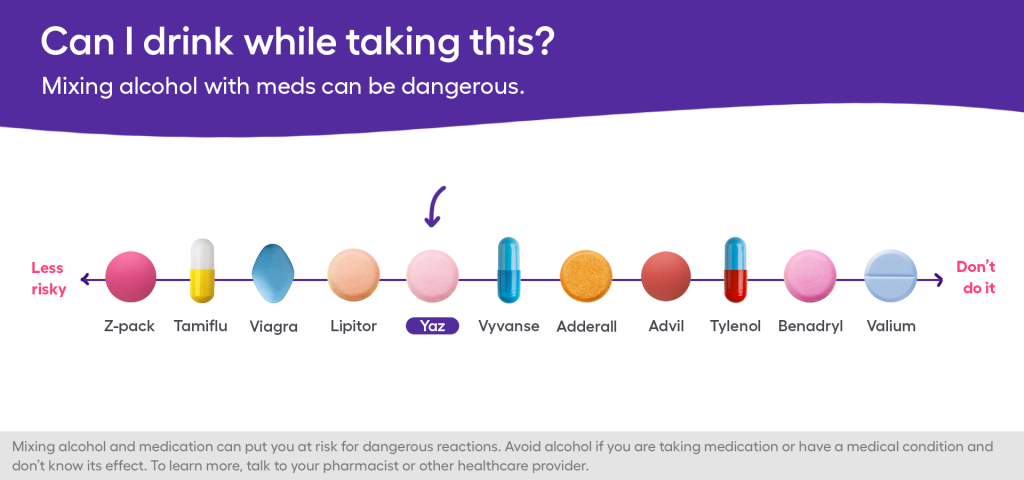If you’ve ever wondered if consuming alcohol affects the safety and efficacy of your birth control pills, wonder no more. The answer is pretty straightforward: It doesn’t, as long as you drink responsibly.
“There is no direct interaction between birth control pills and alcohol, and no reduction in the effectiveness of birth control if somebody drinks alcohol,” says Sally Rafie, Pharm.D., founder of Birth Control Pharmacist, an organization that provides support to pharmacists who prescribe birth control directly to patients (the practice is legal in 10 states).
Impairment is another story
Don’t let that fool you, though—depending on how much you drink, the consumption of alcohol can impact the ability of your birth control pills to prevent pregnancy. How? Drinking too much alcohol can lead to impairment and impairment can lead to things like falling asleep without taking your pill, taking your pill at the wrong time, or forgetting to take your pill altogether (and all of these things will impact the efficacy of your pills). Not to mention, impairment can lead to issues of consent/non-consent and not using a barrier protection, which should always be used to prevent sexually transmitted infections.
“Birth control can be taken any time of day. It just has to be taken at the same time every day,” Dr. Rafie says.

Another potential problem with birth control and alcohol? Drinking so much (after taking your pill) that you start vomiting.
“If you took your birth control in the last couple of hours and then vomit, it is very possible that you are vomiting up the medication,” Dr. Rafie explains. “So that would basically mean that you’ve missed a dose.”
This is a big deal, Dr. Rafie says, because birth control pills must be taken consistently and at the same time each day in order to maintain effectiveness. When used correctly, they are up to 99% effective, but in reality between 5% and 9% of women taking birth control pills become pregnant each year (usually, this is the result of missing doses or not taking it correctly). Missing even one dose is a potential problem—but missing two or more consecutive doses is worse, requiring back-up contraception and a specific protocol to get you back on track with your dosing, the Centers for Disease Control reports.
Additionally, if you are drinking alcohol frequently or in excess and become pregnant, that may increase the risk of adverse effects to a fetus.
Drink responsibly if you are taking birth control pills
The best way to ensure birth control and alcohol doesn’t become a problem? Moderation, says Dr. James Simon, MD, medical director of the Washington, D.C.–based IntimMedicine Specialists. According to the National Institute on Alcohol Abuse and Alcoholism, moderation for women is defined as a maximum of one drink per day.
“Avoiding alcohol is a good thing for everyone, but on a practical basis, alcohol is a part of our culture,” Dr. Simon says. “We are not going to get rid of alcohol, but to reduce the amount and the frequency of use—that would be my goal for any woman coming in [to my practice] wanting to use birth control pills.”
Dr. Rafie agrees, adding that she encourages patients to consider their own level of alcohol consumption when choosing a method of birth control.
“If a patient shares with me that she binge drinks on the weekends … the pill might not be a good option for her,” Dr. Rafie says. “The good news is there are options, and we will find what works best.” Some of these options include the patch, the implant, the vaginal ring, an intrauterine device (IUD), a shot (like Depo-Provera), and a new progestin-only birth control pill (aka mini pill), Slynd, which offers a more forgiving dosing window (Slynd received FDA approval in 2019). And if it turns out the traditional pill is still the best option for you, despite your drinking habits? Dr. Rafie suggests using alarms and birth control reminder apps to help you stick to a schedule.











